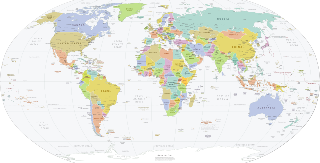This is a list of lists of African Union members:
- List of African Union member states by political system
- Member states of the African Union (may be sorted by name, population, area etc.)
This is a list of lists of African Union members:

A country is a distinct territorial body or political entity. It may be an independent sovereign state or part of a larger state, as a non-sovereign or formerly sovereign political division, a physical territory with a government, or a geographic region associated with sets of previously independent or differently associated peoples with distinct political characteristics. It is not inherently sovereign. The largest country in the world by geographical area is Russia, while the most populous is China. The smallest and the least populous is the microstate Vatican City.

CITES is a multilateral treaty to protect endangered plants and animals. It was drafted as a result of a resolution adopted in 1963 at a meeting of members of the International Union for Conservation of Nature (IUCN). The convention was opened for signature in 1973 and CITES entered into force on 1 July 1975.

The Economic Community of West African States is a regional political and economic union of fifteen countries located in West Africa. Collectively, these countries comprise an area of 5,114,162 km2 (1,974,589 sq mi), and in 2015 had an estimated population of over 349 million.

The Organisation of African Unity was an intergovernmental organization established on 25 May 1963 in Addis Ababa, Ethiopia, with 32 signatory governments. One of the main heads for OAU's establishment was Kwame Nkrumah of Ghana. It was disbanded on 9 July 2002 by its last chairman, South African President Thabo Mbeki, and replaced by the African Union (AU). Some of the key aims of the OAU were to encourage political and economic integration among member states, and to eradicate colonialism and neo-colonialism from the African continent.

The Organisation of African, Caribbean and Pacific States (OACPS) is a group of countries in Africa, the Caribbean, and the Pacific that was created by the Georgetown Agreement in 1975. Formerly known as African, Caribbean and Pacific Group of States (ACP), the organisation's main objectives are sustainable development and poverty reduction within its member states, as well as their greater integration into the world's economy. All of the member states, except Cuba, are signatories to the Cotonou Agreement with the European Union.

The Pan-African Parliament (PAP), also known as the African Parliament, is the legislative body of the African Union and held its inaugural session in March 2004. The PAP exercises oversight, and has advisory and consultative powers, lasting for the first five years. Initially the seat of the Pan-African Parliament was in Addis Ababa, Ethiopia, but it was later moved to Midrand, Johannesburg, South Africa.

A National Olympic Committee (NOC) is a national constituent of the worldwide Olympic movement. Subject to the controls of the International Olympic Committee, NOCs are responsible for organizing their people's participation in the Olympic Games. They may nominate cities within their respective areas as candidates for future Olympic Games. NOCs also promote the development of athletes and training of coaches and officials at a national level within their geographies.
A list of highest points typically contains the name, elevation, and location of the highest point in each of a set of geographical regions. Such a list is important in the sport of highpointing. A partial list of highpoint lists is below:

The African Union (AU) is a continental union consisting of 55 member states located on the continent of Africa. The AU was announced in the Sirte Declaration in Sirte, Libya, on 9 September 1999, calling for the establishment of the African Union. The bloc was founded on 26 May 2001 in Addis Ababa, Ethiopia, and launched on 9 July 2002 in Durban, South Africa. The intention of the AU was to replace the Organisation of African Unity (OAU), established on 25 May 1963 in Addis Ababa by 32 signatory governments; the OAU was disbanded on 9 July 2002. The most important decisions of the AU are made by the Assembly of the African Union, a semi-annual meeting of the heads of state and government of its member states.
This is a list of lists of cities in Europe. Lists of countries includes countries that fall to at least some extent within European geographical boundaries according to certain definitions.
This is a list of lists of places:

The European Union has concluded free trade agreements (FTAs) and other agreements with a trade component with many countries worldwide and is negotiating with many others. The European Union negotiates free trade deals on behalf of all of its member states, as the member states have granted the EU has an "exclusive competence" to conclude trade agreements. Even so, member states' governments control every step of the process.

The member states of the African Union are the 55 sovereign states that have ratified or acceded to the Constitutive Act of the African Union to become member states to the African Union (AU). The AU was the successor to the Organisation of African Unity (OAU), and AU membership was open to all OAU member states.

—The following table lists the independent African states, and their memberships in selected organisations and treaties.